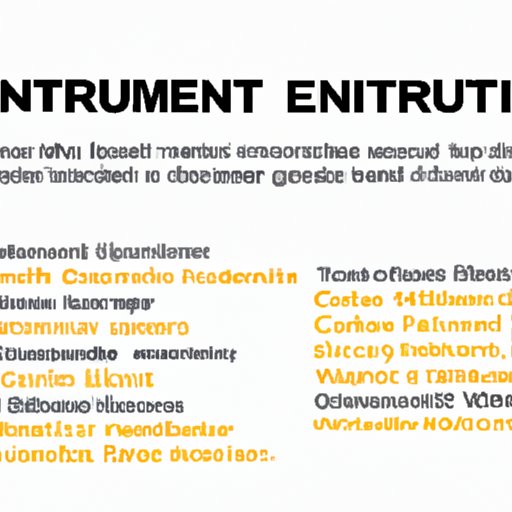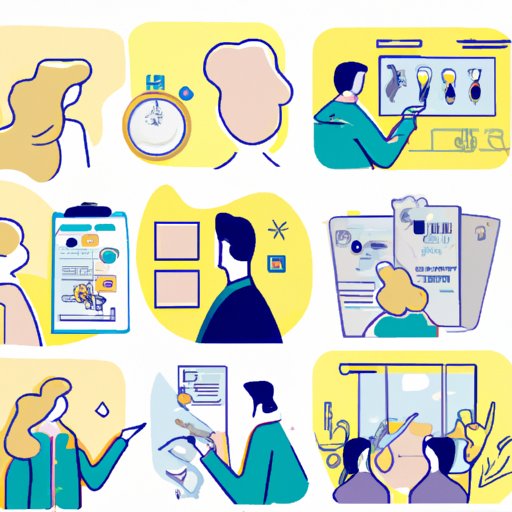Introduction
A cultural interview is an effective way of gathering qualitative data that can be used to gain insight into the beliefs, values, norms, and behaviors of a specific group. Through interviews, researchers can gain a better understanding of how people think, why they act the way they do, and how their culture influences their decisions and actions. This article will provide an overview of what is a cultural interview, the benefits of conducting one, and a step-by-step guide to planning and executing a successful cultural interview.
Definition of a Cultural Interview
A cultural interview is a type of qualitative research method that involves interviewing members of a particular culture to gain insight into their beliefs, values, norms, and behaviors. The goal of a cultural interview is to understand how culture shapes the way people think and act, as well as their attitudes towards certain topics. During a cultural interview, the researcher asks open-ended questions that allow the participants to express their opinions and experiences freely. The researcher then records the responses in order to gain an understanding of the culture and its influence on the participants.

Overview of Benefits of Conducting a Cultural Interview
Cultural interviews are an invaluable tool for gaining insight into a particular culture. By conducting these interviews, researchers can gain a better understanding of how people think, feel, and behave in a given culture. Additionally, cultural interviews can provide valuable information about how a culture views certain topics or issues, which can be useful for making decisions about policy or strategy. Cultural interviews also provide an opportunity for researchers to learn about the history and traditions of a culture, as well as its values and beliefs. Finally, cultural interviews can help researchers identify trends and patterns within a culture, which can lead to more informed decision-making.
Step-by-Step Guide to Planning and Executing a Cultural Interview
The following steps provide a guide to planning and executing a successful cultural interview:
Step 1: Defining Goals and Objectives
Before beginning a cultural interview, it is important to define the goals and objectives of the study. These should include the overall purpose of the study, the topics to be discussed, and the desired outcomes. It is also important to consider who the target audience is and what types of questions need to be asked in order to achieve the desired results.
Step 2: Identifying Target Audience
Once the goals and objectives have been established, it is important to identify the target audience for the cultural interview. This includes determining who will be interviewed, where they will be located, and how many people will be included in the study. It is also important to consider the demographics of the target audience, such as age, gender, race, education level, and occupation.
Step 3: Creating an Interview Plan
After the target audience has been identified, the next step is to create an interview plan. This includes developing a list of questions that will be asked during the interview and deciding how the responses will be recorded. It is also important to determine the length of the interview and whether additional follow-up questions will be needed.
Step 4: Scheduling the Interviews
Once the interview plan has been created, it is time to schedule the interviews. This includes selecting a date, time, and location for the interviews and informing the participants of the details. It is also important to ensure that all necessary materials, such as recording devices and note-taking supplies, are available.

How to Ask the Right Questions During a Cultural Interview
Asking the right questions during a cultural interview is essential in order to gather meaningful data. There are three main types of questions that should be asked: open-ended questions, probing questions, and follow-up questions. Open-ended questions allow the participant to provide a detailed response without feeling constrained by a predetermined answer. Probing questions are designed to encourage the participant to provide more information and elaborate on their answers. Follow-up questions are used to gain further clarification or to explore a topic in more depth.
Tips and Tricks for Ensuring a Successful Cultural Interview
In order to ensure a successful cultural interview, there are several tips and tricks that should be followed. First, it is important to establish rapport with the participants by introducing yourself and explaining the purpose of the interview. Second, it is important to keep the interview structured by asking the same questions to each participant and allowing enough time for them to answer. Finally, it is important to be respectful of the participants’ time and opinions by avoiding leading questions and being mindful of cultural norms.

Analyzing the Results of a Cultural Interview
Once the interviews have been conducted, it is important to analyze the results in order to draw conclusions about the culture. This includes identifying themes and patterns in the responses, evaluating trends, and drawing conclusions about how the culture shapes the beliefs and behaviors of the participants.
Applying Insights Gained from a Cultural Interview
Once the results of the cultural interview have been analyzed, it is important to apply the insights gained to refine strategies, adjust tactics, and make changes. For example, if the cultural interview reveals that a certain topic is sensitive to the participants, the researcher may need to adjust their approach when discussing the topic in future conversations.
Conclusion
Cultural interviews are an invaluable tool for gaining insight into a particular culture. They provide an opportunity to learn about the beliefs, values, norms, and behaviors of a specific group, which can be useful for making decisions about policy or strategy. When planning and executing a cultural interview, it is important to define the goals and objectives, identify the target audience, create an interview plan, and schedule the interviews. During the interview, it is important to ask the right questions and follow certain tips and tricks for ensuring success. Finally, it is important to analyze the results and apply the insights gained to refine strategies and make changes.
(Note: Is this article not meeting your expectations? Do you have knowledge or insights to share? Unlock new opportunities and expand your reach by joining our authors team. Click Registration to join us and share your expertise with our readers.)
